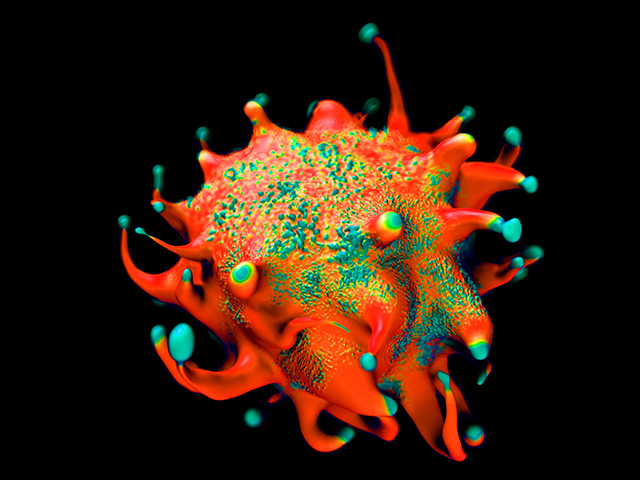Small molecular inhibitors of the Janus kinase (JAK) signaling pathway have been developed of the past several years to effectively treat a host of disorders, such as rheumatoid arthritis, Crohn’s disease, and even cancer. Yet now, new evidence from investigators at the Medical University of Vienna has emerged describing how some patients taking JAK inhibitors to treat myelofibrosis—a rare bone marrow cancer in which too many blood cells are produced—may develop aggressive lymphomas. The findings from the new study were released today in Blood, in an article entitled “Aggressive B-Cell Lymphomas in Patients with Myelofibrosis Receiving JAK1/2 Inhibitor Therapy.”
One of three disorders that fall under the umbrella of myeloproliferative neoplasms is myelofibrosis, which can lead to scarring and hardening inside the bone marrow. The exact cause of myelofibrosis is not known, but it has been linked to the JAK2 gene, which controls the production of blood cells. Doctors often treat the condition with the JAK1/2 inhibitor ruxolitinib.
“While not a cure, JAK inhibitors are very effective at providing symptom relief,” noted co-senior study investigator Heinz Gisslinger, M.D., a professor at the Medical University of Vienna in Austria. “However, we started noticing sporadic cases of lymphomas developing in patients being treated for myeloproliferative neoplasms and wanted to know if this phenomenon was connected to treatment.”
To test whether there was a connection, the investigators assessed 626 patients receiving treatment for myeloproliferative neoplasms at the Medical University of Vienna and identified 69 that had myelofibrosis and were being treated with JAK inhibitors. Of those, four (5.8%) developed lymphomas. In comparison, they found that of the 557 patients who did not receive JAK inhibitors, only two (0.36%) developed lymphomas. That amounts to a 16-fold increased risk for aggressive B-cell lymphoma in patients receiving JAK inhibitors.
“By replicating this link between this B-cell clone and aggressive lymphoma, we hope to speed the discovery of an alternative therapy for myelofibrosis,” explained co-senior study investigator Veronica Sexl, M.D., a professor at the University of Veterinary Medicine, Vienna. “These findings are going to be valuable in clinical care.”
When samples were taken from the patients with myelofibrosis, the research team found a preexisting B-cell clone in the bone marrow for three of the four patients who later developed lymphoma. Further investigation suggested that this clone was the same that later transformed into lymphoma. Interestingly, the researchers were also able to demonstrate an association between JAK inhibition and an increased frequency of aggressive B-cell lymphomas in mouse models.
“We determined that patients with this preexisting B-cell clone in their bone marrow are most at risk for developing aggressive lymphoma,” concluded study co-author Ulrich Jäger, M.D., of the Medical University of Vienna. “We also know that up to 16% of people with myelofibrosis have immunoglobulin gene rearrangements like this B-cell clone. Therefore, our findings suggest that all patients with myelofibrosis should be tested for such gene rearrangements before prescribing JAK inhibitors to treat their disease.”


